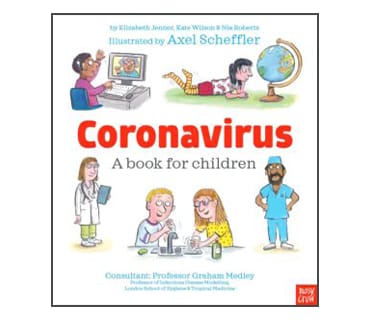
Michelle Vasiliu is a 2018 Write-ability Fellow. She has been a teacher and youth-worker, among many roles working with children. She is now an award-winning children’s and YA author who writes sensitive, serious and sometimes sad stuff. She likes to help her young readers understand and make sense of their world.
When parents are struggling to find the right words and/or grappling with the definition of having an ‘age appropriate’ conversation about difficult topic like the Coronavirus (COVID-19), good quality children’s books may offer a much needed ‘helping hand’. With this in mind, Michelle made a conscious decision to do a worldwide search to find out what books, if any, were available to help children learn about the coronavirus pandemic. In particular, she wanted books that also provided a means to both identify and process difficult emotions children may be feeling. Michelle has given us permission to sample an excerpt from her blog post, which reviews and links to 10 recent publications for children which answer questions about the virus and what it means for children, their families and friends.
How children’s books can help little people cope with COVID-19
Children across the world have had their lives turned upside down due to the coronavirus pandemic. Schools are closed. They’re not allowed to go to playgrounds, have parties or participate in activities like team sports. Even seeing friends and loved ones is extremely limited. And then there is the added uncertainty and anxiety about the pandemic itself.
To help children cope during this challenging period, parents and caregivers are encouraged to have ‘age-appropriate conversations’ with them about the pandemic.
But what do the words ‘age-appropriate conversations’ even mean? Parents aren’t necessarily trained professionals that have the knowledge, skills and expertise to find the right words when talking to children about difficult topics. Many parents actually shy away from talking to children about the tough stuff for all sorts of reasons, including misguided beliefs that their child won’t understand what’s happening or that talking about the tough stuff will frighten them.
In contrast, experts in the field encourage parents to tell children the truth, even in challenging circumstances. Conversations with your child about difficult topics are important. They can help your child cope, be prepared and make sense of what they have been seeing, hearing and feeling. When your child does not understand a situation, they may worry, feel alone or misunderstand what is happening.
Many parents, myself included, learn through experience, often based on ‘trial and error’. Sometimes we get it right, sometimes we don’t, which is another reason some of us might have reservations about talking to our children about the coronavirus pandemic.
As a children’s author I’m passionate about advocating the incredible value children’s books can have in a child’s life. And when parents are struggling to find the right words and/or grappling with the definition of having an ‘age appropriate’ conversation about the difficult topic in question, good quality children’s books may offer a much needed ‘helping hand’.
With this in mind, I made a conscious decision to conduct a worldwide search to find out what books, if any, were available to help children learn about the coronavirus pandemic. In particular, I wanted books that also provided a means to both identify and process difficult emotions children may be feeling.
You can read about and download the books I found in my blog post here.
All the links are included and the relevant authors, illustrators, publishing houses and the like have given permission for these books to be read on-line or down-loaded at no cost.
A few points and tips to consider when talking to children about the coronavirus pandemic:
- Most children worry less about something if they understand it. Providing children with opportunities to talk with their parent or other trusted adults about the pandemic may help reduce their worries. If they don’t understand or have things explained to them, they may make up for gaps in knowledge that could be wrong.
- Children need accurate, age appropriate information. If children are asking questions about the pandemic this usually means they want answers.
- Chose a space and a time which is comfortable for you and your child, ideally somewhere you won’t be disturbed.
- Check with children about what they already know about the coronavirus. Sometimes parents think their children don’t worry because they don’t ask questions. It is important to not assume that being quiet means they understand.
- Listen carefully. Don’t try to interpret what children are asking or have experienced. Instead ask questions to check you have understood what they have told you.
- Ask open-ended questions. Greater discussion will occur when your questions require more than a simple yes or no response. Encourage children to put things in their own words.
- Let your child know that it is okay to ask questions now or later and be prepared to answer questions down the track.
- Reassure children who may feel uncomfortable talking about the pandemic. They may be reluctant to express sadness or anger for fear of causing worry or concern. Children are very loyal. It is important to let children know that it is okay to feel uncomfortable or worried.
- For young children have paper, coloured pencils and play dough at the ready. These mediums often help children to express their feelings when words don’t come easily.
Finding reliable sources of information about the pandemic
Select two to three trusted and reliable sources and familiarise yourself with information that can give you the up-to-date facts. Sticking to these sources means you don’t have to curate the misinformation, myths and rumours that are widespread and can cause you and your children additional worry.
Thanks to Michelle for generously sharing this information with Writers Victoria. To read Michelle’s original blog post, including reviews and links to the books she discusses, click here.
